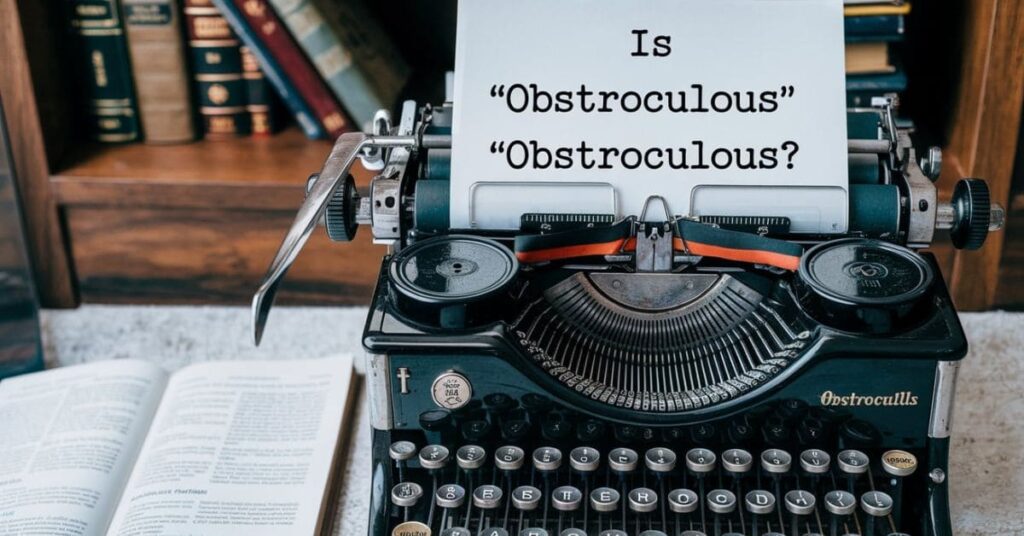Obstroculous: Unraveling the Mystery Behind the Word That Almost Exists

The English language is vast, with a lexicon that evolves constantly. Among the many words that circulate, some are widely recognized and others seem to exist in a gray area—used by some but unknown to many. One such word is “obstroculous.” If you’ve ever come across this term, you might wonder, “Is ‘obstroculous’ a real word?” It’s a question worth exploring, especially since no major dictionary includes it, yet it still manages to make appearances in conversations and even in some written texts.
This article will delve into the origins, meanings, usage, and the peculiar status of the word “obstroculous.” We’ll explore its significance, potential origins, and how it fits into the broader context of the English language. By the end of this article, you’ll have a comprehensive understanding of “obstroculous,” a word that might just be on the cusp of linguistic recognition.
What Does Obstroculous Mean?
An Attempt to Define the Undefined
“Obstroculous” is a word that defies easy classification. Despite its apparent usage in various contexts, it lacks an official definition in authoritative dictionaries like Merriam-Webster or Oxford English Dictionary. However, people who have encountered and used the word often describe it as referring to someone or something that is stubborn, difficult, or obstructive.
It’s often used in a somewhat playful or creative manner, perhaps as a fusion of “obstructive” and “ridiculous” or even “strenuous.” The connotations tend to be negative, suggesting a person or situation that is more than just difficult—something that is actively, almost aggressively, uncooperative or unreasonable.
The Informal Use of Obstroculous
Despite its lack of formal recognition, “obstroculous” is a term that some people have adopted in their vocabulary. It might be used in a sentence like, “My cat is being obstroculous today,” implying that the feline is being particularly stubborn or unmanageable. The word carries an air of exaggeration, making it a colorful addition to any sentence where the speaker wants to emphasize the difficult nature of something.
Related Terms and Their Influence
Given that “obstroculous” isn’t officially defined, it’s helpful to consider related words that might have influenced its usage:
- Obstinate: Stubbornly refusing to change one’s opinion or chosen course of action, despite attempts to persuade one to do so.
- Obstructive: Causing a blockage or hindrance, deliberately making progress difficult.
- Ridiculous: Deserving or inviting derision or mockery; absurd.
These words all share a common theme of difficulty or obstruction, which aligns with how “obstroculous” is often perceived.
The Mystery of Obstroculous: Is It a Real Word?
The Case for Obstroculous Being a Real Word
Language is ultimately defined by usage. While “obstroculous” may not appear in standard dictionaries, it has found a place in the vocabulary of some English speakers. If enough people understand and use a word consistently, it begins to carve out a niche for itself in the language, even if it’s not formally recognized. From this perspective, “obstroculous” could be considered a real word—one that’s in the process of emerging from informal usage into broader acceptance.
The Case Against Obstroculous Being a Real Word
On the other hand, the lack of formal recognition poses a challenge to “obstroculous” being considered a real word. Without an official definition or etymology, it remains a linguistic curiosity—a word that exists more in the imagination than in the lexicon. Critics might argue that “obstroculous” is simply a playful, made-up term that hasn’t gained the widespread acceptance needed to be considered a legitimate word.
The Role of Neologisms in Language
“Obstroculous” can be viewed as a neologism—a newly coined word or expression that may or may not become a permanent part of the language. The English language is full of neologisms that have successfully made the transition into common usage. Words like “selfie,” “blog,” and “Google” (as a verb) were once novel creations that eventually became widely accepted.
Whether “obstroculous” will follow a similar path remains to be seen. Its journey from an obscure, possibly humorous creation to a recognized part of the English language is uncertain, but not impossible.
The Origins of Obstroculous
Tracing the Roots
The exact origins of “obstroculous” are difficult to pin down. Unlike most words, which have clear etymological roots, “obstroculous” seems to have sprung up without a clear linguistic lineage. There are no ancient Greek or Latin roots to be found, no historical texts that document its first usage. This lack of origin story adds to the mystery of the word.
Some speculate that “obstroculous” might be a portmanteau, combining elements of “obstruct” or “obstinate” with another term, perhaps “ridiculous” or “calamitous.” This blending of words is not uncommon in English, where many modern terms are created by merging existing ones.
The Influence of Pop Culture
It’s also possible that “obstroculous” originated as a form of slang or in popular culture, gradually spreading through casual conversation. Words like “ginormous” (a blend of “gigantic” and “enormous”) have followed a similar trajectory, starting as playful or humorous expressions before gaining broader acceptance.
“Obstroculous” may have emerged in a similar way, perhaps in a television show, movie, or online forum where creative language often thrives. The internet, in particular, is a fertile ground for the creation and dissemination of new words, as people experiment with language in informal settings.
The Usage of Obstroculous in Modern Language
Examples in Sentences
While “obstroculous” may not be widely recognized, those who use it often do so in creative ways. Here are a few examples of how the word might be used in sentences:
- In a Conversation About a Difficult Situation:
- “The meeting was completely obstroculous; no one could agree on anything, and it felt like we were just talking in circles.”
- Describing a Stubborn Individual:
- “My neighbor is being obstroculous about letting me trim the hedge. He’s refusing to see reason, even though it’s growing onto my property.”
- Talking About a Challenging Task:
- “Trying to fix the car by myself turned out to be an obstroculous endeavor; every time I thought I had solved one problem, another one popped up.”
The Appeal of Using Obstroculous
The appeal of “obstroculous” lies in its uniqueness and expressiveness. It’s a word that, while not officially recognized, conveys a specific kind of frustration or difficulty that other words might not fully capture. Using “obstroculous” can add a bit of flair to language, making descriptions more vivid and memorable.
For those who enjoy playing with language, “obstroculous” offers a way to express complex feelings or situations in a single, albeit unconventional, word. It’s a testament to the creativity inherent in language and the endless possibilities for expressing ideas.
The Linguistic Future of Obstroculous
Will Obstroculous Become a Recognized Word?
The future of “obstroculous” as a recognized word in the English language is uncertain. For it to gain official status, it would likely need to be used consistently in a variety of contexts—appearing in literature, journalism, and everyday conversation. Over time, if enough people use and understand the word, lexicographers might consider adding it to dictionaries.
The Role of Dictionaries in Language
Dictionaries often serve as the gatekeepers of language, determining which words are considered legitimate. However, they also reflect how language is used in real life. If “obstroculous” continues to be used by people in meaningful ways, it could eventually make its way into formal dictionaries. Until then, it remains a word on the fringe—a linguistic experiment that’s still evolving.
Encouraging Creative Language Use
Whether or not “obstroculous” becomes a recognized word, its existence highlights the importance of creativity in language. English, like all languages, is constantly evolving, and new words are born out of necessity, humor, and innovation. By experimenting with words like “obstroculous,” speakers contribute to the ongoing evolution of the language.
FAQs About Obstroculous
1. Is “obstroculous” a real word?
- Answer: “Obstroculous” is not officially recognized by major dictionaries, but it is a word that some people use in conversation. It typically refers to something or someone that is stubborn, difficult, or obstructive.
2. Where did the word “obstroculous” come from?
- Answer: The exact origins of “obstroculous” are unclear. It may be a blend of other words like “obstructive” and “ridiculous.” It seems to have emerged from informal usage rather than from a specific linguistic root.
3. Why isn’t “obstroculous” in the dictionary?
- Answer: “Obstroculous” is not widely recognized or used enough to be included in most dictionaries. For a word to be added to a dictionary, it typically needs to be used consistently in various contexts over time.
4. Can I use “obstroculous” in formal writing?
- Answer: While you can use “obstroculous” in informal writing or creative contexts, it might not be appropriate for formal writing since it’s not officially recognized. However, if you clearly define the word when you use it, it could add a unique touch to your writing.
5. What are some synonyms for “obstroculous”?
- Answer: Since “obstroculous” isn’t officially defined, it doesn’t have direct synonyms. However, related words like “obstinate,” “obstructive,” and “stubborn” might convey similar meanings.
6. How do you pronounce “obstroculous”?
- Answer: “Obstroculous” is typically pronounced as /ob-STROK-yuh-luhs/. The pronunciation follows the pattern of similar words like “obstructive.”
7. Is “obstroculous” a neologism?
- Answer: Yes, “obstroculous” can be considered a neologism—a newly coined word that has not yet been widely accepted or recognized.
8. Can I create my own words like “obstroculous”?
- Answer: Absolutely! The English language is always evolving, and new words are created all the time. If you coin a new word and it catches on, it could eventually become part of the language.
Conclusion: The Curious Case of Obstroculous
“Obstroculous” is a fascinating example of how language can be both fluid and elusive. It’s a word that exists in the minds and conversations of those who use it, yet it remains unrecognized by formal linguistic authorities. Whether “obstroculous” will one day earn a place in the dictionary is uncertain, but its journey highlights the playful and creative nature of language.
As you navigate the ever-changing landscape of English, “obstroculous” serves as a reminder that language is not static. It’s an evolving tool that reflects the creativity and innovation of its speakers. So, the next time you encounter a difficult situation or a stubborn individual, consider using “obstroculous”—you might just contribute to the growth of the English language in your own small way.
By exploring the potential meanings, origins, and future of “obstroculous,” we’ve uncovered a word that, while not officially recognized, embodies the dynamic and evolving nature of language. Whether it remains an obscure curiosity or becomes a fully accepted term, “obstroculous” is a testament to the endless possibilities of linguistic expression.





